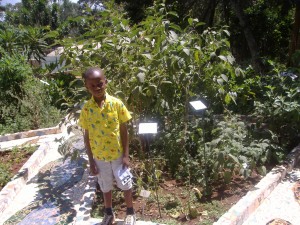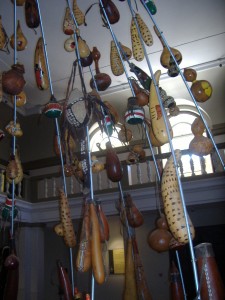- Bees? We don’t need no stinkin’ bees.
- “…a distinct product of America…”
- Friesians? We don’t need no stinkin’ Friesians.
- Kenya tests for Ug99 resistance.
- Iceland’s horses walk funny.
- Neanderthals ate snails.
- Bear meat? We don’t need no stinkin’ bear meat.
- Organic agriculture in China gets NPR treatment, survives.
- Rice? We don’t need no stinkin’ rice.
Nibbles: Foodways, Ecosystem services, Subsistence, Genebank
- Cajun squirrel crisps, anyone? Jeremy comments: “Burgoo that for a laugh”.
- An Office of Ecosystem Services and Markets? In the USDA? Pinch me!
- “In 2009 my plan is to grow a lot of things, like millet, groundnuts and sorghum, but my energy is waning.”
- “Noah’s Bin, will be the fourth largest of its kind in the world.” In Turkey, apparently.
Videos on traditional food systems
The Centre for Indigenous Peoples’ Nutrition and Environment (CINE) based in McGill University, Canada, responded to requests from indigenous leaders from around the world to help stop loss of traditional food system knowledge with research and community-driven activities that bridge the generation.
This series of videos presents highlights from 12 indigenous community areas in 9 countries, and is intended to con tribute to the evidence base used to make global policies to protect Indigenous Peoples’ food resources and promote good health.
Thanks to Lois Englberger for the tip.
Nibbles: UG99, Medicinals, Participation, Climate change, Svalbard
- Rust never sleeps. Good news and bad from CIMMYT.
- Medicinal plant, heal thyself!
- Seven-step programme to livestock breed recognition in new New Agriculturist.
- “The most extreme summers of the last century will become the norm…“
- Svalbard Global Seed Vault makes another Top 10 list.
(Not much) agrobiodiversity on display in Nairobi museum
The main building of the National Museums of Kenya in Nairobi has had a facelift, courtesy of the EU. Pretty good job on the outside, but the new exhibits were a bit of a disappointment.

There’s a big hall about Kenya’s animals, of course, and another series of displays about its cultures, arranged by life-stages (birth, youth, adolescence, initiation: you get the picture), though this includes very little about agriculture:

But there’s nothing at all on the country’s ecosystems and protected areas, and nothing on its plants, at least inside the building (apart from a display of an herbarium specimen in the small hall describing the museum’s history). There is a little botanic garden dedicated to medicinal plants (arranged by family, the wisdom of which is debatable), but this misses the opportunity of describing the Amaranthus on display as not just a medicinal but also a nutritious traditional leafy green (see my next post):

However, the entrance hall does have a terrific display of cucurbit diversity:

These bottle gourds are used by the Maasai and other pastoralists to store water, milk, blood, and mixtures thereof. Here’s a close-up:
